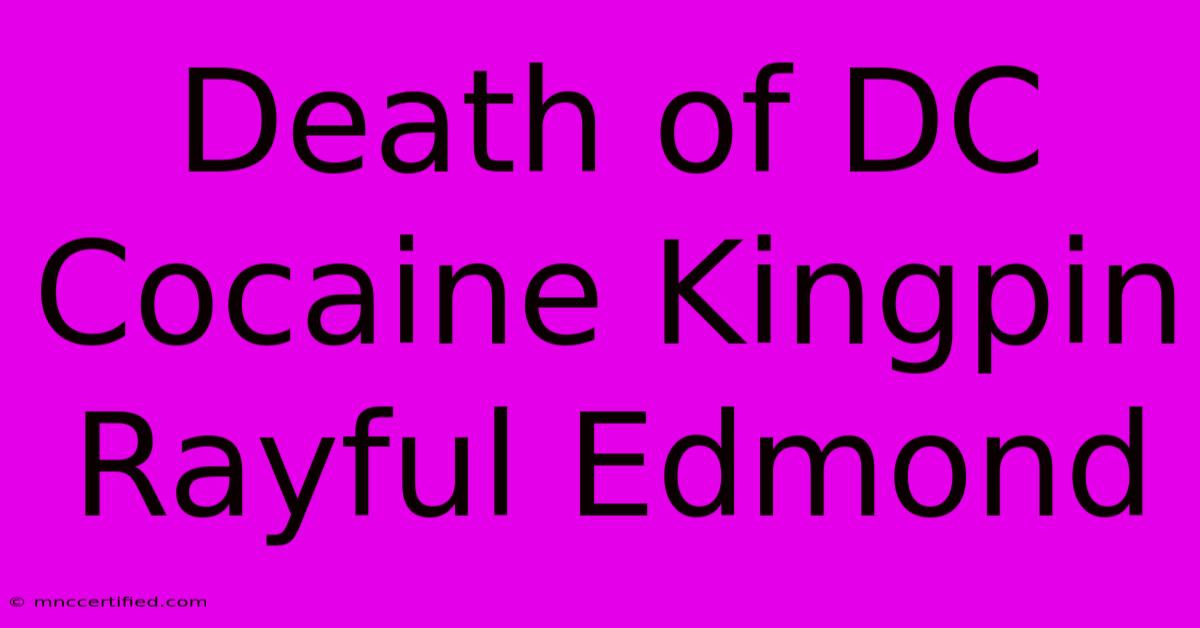Death Of DC Cocaine Kingpin Rayful Edmond

Table of Contents
The Death of Rayful Edmond: The Fall of a DC Cocaine Kingpin
Rayful Edmond Jr.'s name resonates even today as a symbol of the destructive power of the drug trade in Washington, D.C. His rise and fall, culminating in his recent death, serves as a cautionary tale about the fleeting nature of ill-gotten gains and the long reach of justice. This article delves into the life and death of this notorious figure, exploring his reign of terror, his eventual downfall, and the lasting impact of his criminal empire.
The Rise of a Drug Lord
Edmond, a young man from the streets of Northwest D.C., built a vast cocaine trafficking network in the 1980s. His operation, characterized by violence and intimidation, flooded the city with drugs, fueling addiction and crime on an unprecedented scale. His ruthlessness and entrepreneurial spirit, however twisted, allowed him to amass a fortune estimated to be in the tens of millions of dollars. He operated with a level of sophistication rarely seen in the drug trade at the time, employing complex money laundering schemes and a network of informants. The Edmond organization became a symbol of the city's struggle with drug-related violence, impacting countless lives and communities.
Key Factors in Edmond's Success:
- Strategic Partnerships: Edmond forged alliances with other drug traffickers, expanding his reach and influence.
- Sophisticated Operations: His network was highly organized, utilizing various methods to distribute and launder money.
- Intimidation and Violence: He maintained control through fear, eliminating rivals and silencing witnesses.
- Exploitation of Weaknesses: He adeptly exploited vulnerabilities in law enforcement and the justice system.
The Inevitable Fall
Despite his initial success, Edmond’s empire was built on a foundation of sand. The relentless efforts of law enforcement, including the Drug Enforcement Administration (DEA) and the Metropolitan Police Department (MPD), eventually caught up with him. Undercover operations, wiretaps, and informant testimony slowly chipped away at his organization. The accumulation of evidence, combined with internal betrayals, ultimately led to his arrest in 1989.
The Trial and Conviction:
Edmond's trial was a high-profile event, capturing the attention of the entire nation. The prosecution presented overwhelming evidence of his criminal activities, including testimony from former associates. He was found guilty on multiple counts of drug trafficking and conspiracy, facing a life sentence without the possibility of parole. His conviction marked a significant victory for law enforcement in their fight against drug trafficking, demonstrating that even the most powerful figures could be brought to justice.
Life Behind Bars and Death
Edmond spent the remainder of his life in federal prison. While incarcerated, he maintained a certain notoriety, his name a chilling reminder of the devastation caused by his criminal enterprise. News of his death, while not unexpected given his age and health, served as another chapter in a saga that continues to shape the narrative of D.C.'s history.
The Lasting Legacy of Rayful Edmond
Rayful Edmond’s story serves as a potent reminder of the devastating consequences of the drug trade. His life and death highlight the importance of ongoing efforts to combat drug trafficking, support communities affected by drug violence, and invest in prevention and rehabilitation programs. The legacy of his criminal empire continues to be felt in Washington, D.C., shaping discussions on crime, poverty, and the fight for social justice. His story remains a cautionary tale, demonstrating the ultimately destructive path of unchecked greed and violence. His downfall underscores the crucial role of law enforcement and the eventual triumph of justice, however long it takes.
Keywords: Rayful Edmond, DC drug kingpin, cocaine trafficking, Washington DC crime, DEA, MPD, drug war, organized crime, life sentence, criminal justice, drug violence, legacy, downfall, rise and fall.

Thank you for visiting our website wich cover about Death Of DC Cocaine Kingpin Rayful Edmond. We hope the information provided has been useful to you. Feel free to contact us if you have any questions or need further assistance. See you next time and dont miss to bookmark.
Featured Posts
-
Chan Macchio Wang In Karate Trailer
Dec 18, 2024
-
Real Madrid Vs Chelsea Womens Champions League
Dec 18, 2024
-
Glasgow Sam Fender Gig Cancellation
Dec 18, 2024
-
West Virginia Vs Memphis Key Moments
Dec 18, 2024
-
Travel Affected Strong Winds In South Wales
Dec 18, 2024